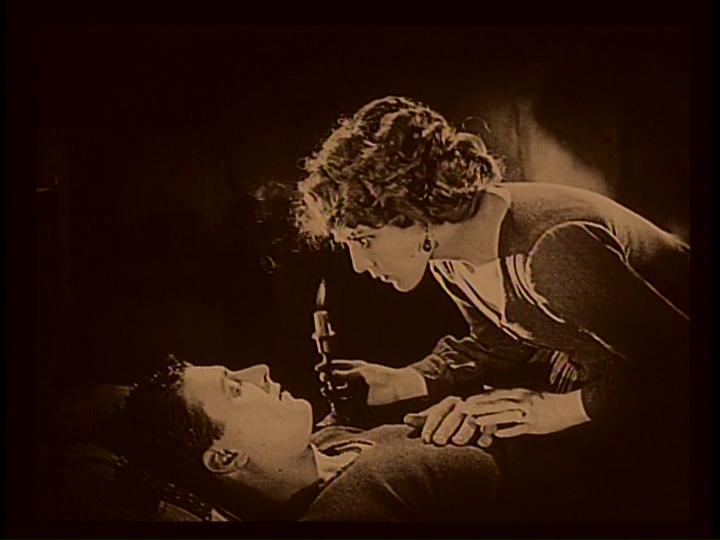Mary Pickford plays an Italian woman whose brothers have gone off to fight in World War One. Alone and worries, she discovers a sailor washed up on the shore. He tells her that he is an American and they secretly marry but is her husband really who he claims to be?
Italian dressing.
After co-founding United Artists, the rest of Mary Pickford’s silent career was a balancing act between the child roles and whimsy that her fans had come to love and the heavier, more artistically satisfying parts that Pickford craved.
The Love Light came on the heels of Pollyanna and Suds, the former being a famously sugary child role and the latter a slapstick-and-pathos story of a laundress in love. The Love Light was meant to give Pickford some heavier drama and it was directed by her best friend, noted screenwriter Frances Marion. (By the way, Marion later recalled that both she and Pickford found Pollyanna “nauseating” so a change of pace was needed all around.)
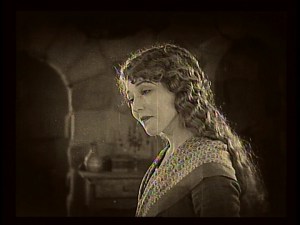
The Love Light is the story of Angela (Pickford), a young Italian woman whose family operates the local lighthouse. She lives with her two brothers and is being courted by Giovanni (Raymond Bloomer). Of course, the Great War breaks out and her brothers go to fight, as does Giovanni. One brother is killed immediately and Angela waits alone for news of her other loved ones.
One night, Angela finds a man (Fred Thomson, Mr. Frances Marion) washed up on the shore. He says that his name is Joseph and he is an American deserter. Angela feels sorry for him and hides him in her cellar. Naturally, they fall in love and are secretly married. Also, Angela finds out that Germans engrave “Gott mit uns” on just everything. (This coarse exposition is in no way foreshadowing, nope, nope, nope.)
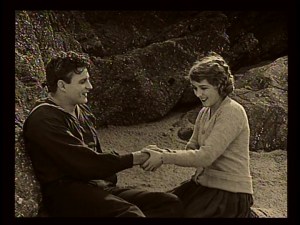
Joseph does have one odd request of his wife: he wants her to give him a “love signal” from the lighthouse at precisely midnight. Angela obeys and, would you believe it, an Italian ship is sunk at precisely that time.
So then Joseph is like, “It’s been real but I have to get back to America, toots.” Angela goes to the village to steal chocolate for him and is nearly caught. When she returns, she finds him asleep in the cellar. She leans closer and…
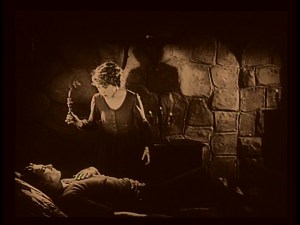
In his sleep, Joseph mumbles three words: Gott mit uns.
Sigh. Really, movie? Really? The reveal is silly as silly as an Englishman saying “God save the King!” or an American saying “I pledge allegiance to the flag…” in their sleep. And coming so conveniently on the heels of Angela learning the phrase, it feels artificial and forced.
So, congratulations, Angela. You have married a German spy. And she also discovers that her beloved baby brother was on that ship that was destroyed the night before. Da da DUM!
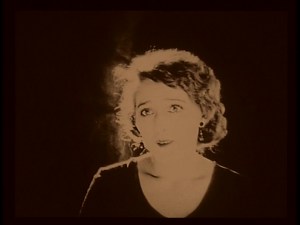
What will Angela do? Will she give hubby the heave-ho? Watch The Love Light to find out.
Spoiler Because This Really Bugs Me: So, Angela makes her choice and turns her husband over to the villagers, Joseph dies trying to escape, now we just need Giovanni to come home and… What? There’s another half hour remaining? Oh good lord. Basically, we get reel after reel of, “Golly, war sure is awful, isn’t it?” Also, snotty nuns will take your child because they think you’re crazy and will give the infant to a totally random OTHER crazy lady. Yay?

Signed,
Italians
In its review of the picture, Photoplay Magazine stated that “the story is developed without reasonable logic” and I have to agree. Pickford is delightful, especially in the earlier lightweight scenes, but the film jumps around from genre to genre and plot thread to plot thread without sufficiently setting itself up for the transition. Instead, it relies on cheats and old propaganda tricks that were as stale in the 1920s as they are now.
Both silent films and black and white films deserve to be treated as works of art in their own right. Neither sound nor color are missing. That being said, I do get annoyed when the lack of color or sound are used to cheat the viewer of information they could use to solve the mystery.
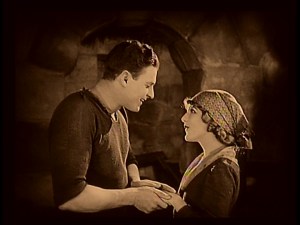
For example, the 1947 Bogart and Bacall vehicle Dark Passage hinges on a character adoring the color orange and even having a car in that dramatic shade. Of course, since the film is black and white, we never recognize that distinct car and so the big reveal feels cheap.
The same is the case with The Love Light. To explain his accent, Joseph claims to be an American and Angela believes him. All well and good but we in the audience are denied hearing whether his accent is American or German and so the eventual reveal that he is a German spy feels just as cheap as the Dark Passage finale.
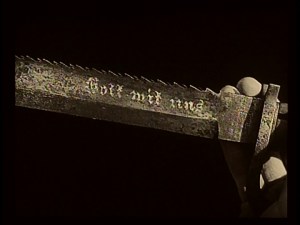
Another problem with the film is that it’s still in Great War Hate the Hun mode when the movies had pretty much moved on. In his review, Carl Sandburg wrote: “It almost looks as though the play was written during the war to be show in Italy to keep alive interest in the war.” The Four Horseman of the Apocalypse, which opened two months after The Love Light, showed the way forward for Great War pictures with its themes of divided families, honor and, of course, a some very hot tangos.
(I know that none of you will have trouble with this distinction but for the Hollywood screenwriters who do not seem to understand this: There were no Nazis in the First World War!)
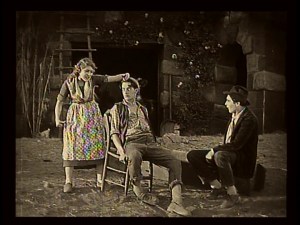
It seems obvious that Frances Marion was stretched too thin by the project. She had written great screenplays before and she would write great screenplays again but the combined task of writing and directing, plus all the personal baggage that came with a cast full of her nearest and dearest, seems to have been too much. Ironically, Marion fares better as a director than a screenwriter in this picture.
As stated above, Pickford is delightful when she engages in slapstick early in the picture. One of the best and most underrated comediennes in film, Pickford capers and prances and tries to beat up her brothers in the best comedy tradition. She does her best with the later dramatic scenes but the setups are so silly that she is undermined. (Of course, Pickford was the producer, so she also shoulders responsibility for the film’s failures.)
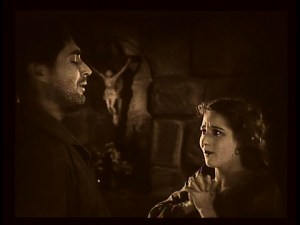
Further, Angela is not a particularly appealing heroine on paper because she only acts if something affects her personally. She only turns in Joseph upon realizing that he was directly responsible for her brother’s death, she only takes action to save a storm-battered ship when she realizes her baby is aboard. Any charm in the character is due to Pickford’s talents as an actress.
On the plus side, Henry Cronjager and Charles Rosher’s camera work is absolutely gorgeous. Dramatic shots of storms and boats and fires and silhouettes and candlelight, lamplight and, of course, the lighthouse. Moody, gorgeous and warm, this picture is a feast for the eyes.
In the end, this film is an example of a picture made by enormous talents that just does not work. It’s one of the more heartbreaking facts of the film industry but sometimes everyone can be doing the right thing and still end up with a dud.
The Love Light is a plot that would have worked as a dramatic one-reeler but it just doesn’t have the oomph to be stretched out to feature length. The final third of the film feels tacked on and nothing is really very satisfying. The cinematography is an enormous draw, of course, and the film’s lighter moments work but the whole thing is kind of a mess. It’s an interesting bit of film history but not necessarily great entertainment.
Where can I see it?
The Love Light was released on DVD by Milestone but that edition is out of print. I have not yet viewed the Film Detective release.
***
Like what you’re reading? Please consider sponsoring me on Patreon. All patrons will get early previews of upcoming features, exclusive polls and other goodies.
